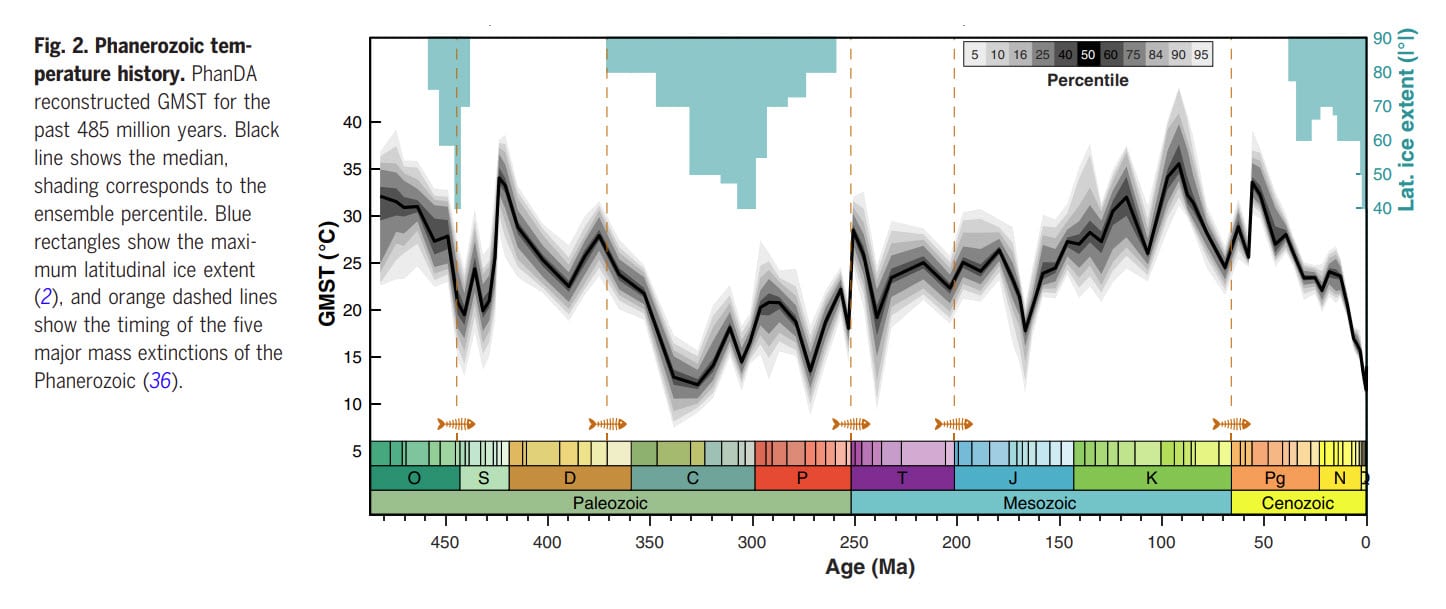In the ongoing debate around climate change, a dominant narrative positions CO2 as the primary driver of rising global temperatures. Billions of dollars are being invested in reducing carbon emissions, and sweeping policies are reshaping entire industries—electric cars are being pushed, combustion engines are being phased out, and we’re even seeing the rise of biomass energy plants as a “green” alternative. But what if the focus on CO2 reduction is misguided and ineffective in achieving the desired climate outcomes?
A recent study by Judd et al. found that we’re not moving near the warmest period in 485 million years; on the contrary, we’re in the coldest ─ 21 degrees below a GMST temperature peak of 36 degrees. Judd et al. concluded: “PanDA GMST exhibits a strong relationship with atmospheric CO2 concentrations [..]. However, because solar luminosity has also changed through time, the relationship is rather enigmatic; [..] our understanding of how forcings and feedbacks on deep timescales balance—or enhance—one another is incomplete.”
But that’s not where this story ends. There’s an element that’s mainly being overlooked in the discussion: trees. Trees are not just carbon sinks but are essential to the water cycle. When trees thrive, they release water vapor into the atmosphere through transpiration, helping form clouds and encouraging rainfall. This creates what we might call “air trees”—a natural system sustaining green environments, even in deserts, through increased moisture and rainfall. We can restore ecosystems, prevent desertification, and enhance local climates by planting more trees.
Yet, what are we doing? In the name of “green energy,” we’re cutting down trees to fuel biomass plants. These plants burn vast amounts of wood under the guise of reducing CO2 emissions, but in doing so, they eliminate the very trees that absorb CO2 and generate rainfall. Fewer trees mean fewer “air trees,” leading to less rain, more droughts, and rising temperatures. Over recent decades, we have seen a measurable decrease in these “air trees,” exacerbating environmental problems and threatening the ecosystems we claim to protect.
This chain reaction—deforestation, reduced rainfall, and increased temperatures—directly results from misguided policies. We are dismantling the natural systems that help regulate climate in pursuit of CO2 reductions that offer almost no tangible benefit. Worse, these policies are destroying industrial ecosystems, particularly in sectors like automotive manufacturing, deploying directly and indirectly 13.8 million people or 6.8% of total EU employment (European Commission, 2016), which are deeply intertwined with local economies.
Rather than focusing solely on reducing CO2 emissions, we should invest in reforestation and protecting existing forests, offering a more sustainable solution. Forests not only help absorb CO2 but also stabilize local climates through rainfall generation. By planting more trees and allowing ecosystems to flourish, we can achieve far more than by dismantling industries and investing in technologies that, at best, offer marginal improvements.
It’s time to shift the narrative and focus on the real issues—environmental degradation, social inequality, and geopolitical tensions—rather than fixating on CO2 as the sole driver of the inevitable climate change as we emerge from the Little Ice Age. We need a broader perspective that considers the vital role of natural ecosystems and recognizes that sometimes, we might do more harm than good in our rush to save the planet.
Author
-
Edwin Korver is a polymath celebrated for his mastery of systems thinking and integral philosophy, particularly in intricate business transformations. His company, CROSS/SILO, embodies his unwavering belief in the interdependence of stakeholders and the pivotal role of value creation in fostering growth, complemented by the power of storytelling to convey that value. Edwin pioneered the RoundMap®, an all-encompassing business framework. He envisions a future where business harmonizes profit with compassion, common sense, and EQuitability, a vision he explores further in his forthcoming book, "Leading from the Whole."
View all posts Creator of RoundMap® | CEO, CROSS-SILO.COM






